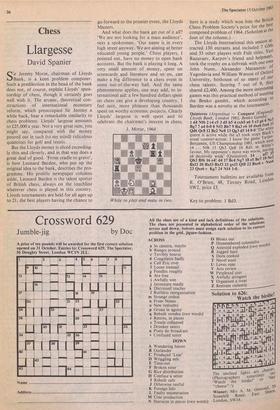Chess
Llargesse
David Spanier
Sir Jeremy Morse, chairman of Lloyds Bank, is a keen problem composer. Such a predilection in the head of the bank does not, of course, explain Lloyds' spon- sorship of chess, though it certainly goes well with it. The arcane, theoretical con- structions of international monetary reform, which preoccupied Sir Jeremy a while back, bear a remarkable similarity to chess problems. Lloyds' largesse amounts to £25,000 a year. Not a very great sum, you might say, compared with the money poured out in such (to my mind) ridiculous quantities for golf and tennis.
But the Lloyds money is sliced exceeding- ly thin and cleverly, and in that way does a great deal of good. 'From cradle to grave', is how Leonard Barden, who put up the original idea to the bank, describes the pro- gramme. His prolific newspaper columns aside, Leonard Barden is the talent spotter of British chess, always on the touchline wherever chess is played in this country. Lloyds tournaments are held for all ages up to 21, the best players having the chance to
go forward to the premier event, the Lloyds Masters.
And what does the bank get out of it all? 'We are not looking for a mass audience', says a spokesman. 'Our name is in every high street anyway. We are aiming at better educated young people.' Chess players, I pointed out, have no money to open bank accounts. But the bank is playing it long. A very small amount of money, spent on scorecards and literature and so on, can make a big difference to a chess event in some out-of-the-way hall. And the same phenomenon applies, one may add, to in- ternational aid: a few hundred dollars spent on chess can give a developing country, I feel sure, more pleasure than thousands spent on worthy economic projects. Clearly Lloyds' largesse is well spent and to celebrate the chairman's interest in chess, J. Morse, 1964
White to play and mate in Iwo.
here is a study which won him the British Chess Problem Society's prize for the best composed problem of 1964. (Solution at the foot of the column.)
The Lloyds International this season at- tracted 130 entrants and included 7 01/445, and 33 other players with Fide titles. Yuri Razuvaev, Karpov's friend and helpmeet, took the trophy on a tiebreak with our own John Nunn, Alexander Matanovic of Yugoslavia and William Watson of Oxford University, hothouse of so many of our chess talents. Scoring 7 out of 9, they shared £2,400. Among the more interesting games was this practical method of meeting the Benko gambit, which according to Barden was a novelty at the tournament• Quinteros (Argentina) — Conquest (En814144: Lloyds Bank, London 1983; Benko Gambit. 1 d4 Nf6 2 c4 c5 3 d5 b5 4 cxb5 a6 5 e3 g6 6 Nei Rg7 7 a4 0-08 Nf3 Bb7 9 Ra3 e6 10 dxe6 fxe6 Qd6 Qc8 12 Be2 Ne8 13 Qg3 d5 14 0-0 'The white queen is active while the a3 rook stops Black s usual counter-action. I knew the game Tarjan- Benjamin, US Championship 1983, which went 14 ... Nf6 15 Qh3 Qe8 16 Rdl in White's favour. My opponent's move was worse, leaving e6 decisively weak' (Quinteros). 14 .. • ar Qh3 Bf6 16 e4! d4 17 Bc4 Ng7 18 e5 Be7 19 L'e, Bxf3 20 Rxf3 Rxf3 21 gxf3 Qf8 22 Bxe6 + Nov 23 Qxe6 + Kg7 24 N14 1-0.
Tournament bulletins are available from R. O'Brien, 48, Tierney Road, London
SW2, price £3.
Key to problem: 1 Bd3.










































 Previous page
Previous page